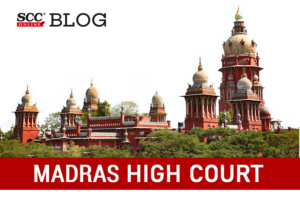Madras High Court: The University Grants Commission (‘UGC’) filed a writappeal against the order of the Writ Court , wherein the Court had quashed the clause imposed by UGC, which interfered with the right of Universities to conduct various distance education programmes by setting territorial limits to them, the division bench of R. Subramanianand and K. Kumaresh Babu, JJ. upheld the right of the UGC to impose Regulation for territorial jurisdiction referring to the primacy given to the UGC under the UGC Act, 1956, as well as Entry 66 of List 1 of the 7th Schedule.
The main issue was whether UGC, a body which has the power to recognise distance education programmes by various Universities, can impose restrictions on the territorial jurisdiction of various Universities?
Background:
In 1991, a separate Council called Distance Education Council was established, and the UGC exercised its power through the Council. The UGC framed regulations called University Grants Commission (Non-Formal/ Distance Education) Regulations 1985 (‘Regulation, 1985’). These regulations primarily prescribed qualifications of students, period of the course of study, qualification of teachers, and conduct of examinations. Among other things, the Regulation also required Universities to set up study centres outside the Headquarters in areas where there is a reasonable concentration of students. Further, it required the Higher Educational Institutions to adhere to the policy of the territorial jurisdiction prescribed in Annexure 3 of the Regulations. It also required Universities established or incorporated by or under the State Act shall offer programmes in open and Distant learning mode and operate all other related activities only within territorial jurisdiction allotted to it under its Act and in no case beyond the territory of the State of its location.In 2012, UGC attempted to restrict the territorial jurisdiction of a University, while granting recognition to Annamalai University and set out various conditions for the grant of recognition. One such condition was that the territorial jurisdiction of the State Universities will be as per their Acts and Statutes but not beyond the boundaries of their respective States, which led to the petitions.
The University contended that the territorial jurisdiction would apply only for regular courses and not for distance education courses. Further, the restriction of the territorial operations imposed by the Distance Education Council are beyond its powers under the UGC Act as well as the Annamalai University Act, 1929.
The Court said that the UGC Act gives primacy to UGC in respect of coordination of University education and determination and maintenance of standard of teaching, examination and research.
Further, theCourt tested the powers of the UGC to frame Regulations with reference to the territorial operation of the Universities, and concluded that UGC Regulations would prevail in view of the primacy given to the UGC under the UGC Act, as well as Entry 66 of List 1 of the 7th Schedule of the Constitution. It took note of Prof. Yashpal v. State of Chhattisgarh, (2005) 5 SCC 420, wherein the Court has recognised the position of the UGC and the supremacy of the Parliament in matters relating to coordination and determination of standards in Institutions of higher education. It also relied on State of T.N. v. Adhiyaman Educational & Research Institute, (1995) 4 SCC 104, wherein the Court has considered the expression ‘coordination’ used in Entry 66 of the union list. It concluded that ‘coordination’ does not merely mean evaluation. It was also made clear that a state legislation would not impede a central legislation on the topic
Further, the Court said that invocation of Article 19 by the writ Court could not be sustained as Article 19 would only apply to citizens and not to Universities. It also said thatthe writ Court had mainly relied on the absence of Regulations to hold that the UGC’s decision to restrict territorial operation was beyond its powers. Since the introduction of the 2017 Regulations and the modified Regulations introduced in 2020, that provides that the activities should be as per the territorial jurisdiction allotted to the University under the UGC Act., the reliance by the Writ Court on the 1985 Regulation, which did not contain any provision regarding the territorial operation of Universities, is no longer relevant.
It was said that the Universities could enroll students from outside the State. However, other activities, such as the establishment of learner support centres, the conduction of examinations etc., must be within the limits of the State. Insofar as the deemed to be Universities are concerned, they can conduct online distance education programmes in compliance with the Regulations of the UGC upon having recognition from UGC.
The Court stated that students who have been enrolled in programmes under the protection of interim orders of this Court would be protected, and their degrees would be valid.
Thus, the Court upheld the right and primacy of UGC to impose Regulations for conduct of distance education programmes.
[The UGC vs Annamalai University 2023 SCC OnLine Mad 567 decided on 20-01-2023]
Advocates who appeared in this case :
For the Appellants: Advocate G. Rajapopalan, Advocate P.R Gopinathan;
For the Respondents: Advocate Isaac Mohanlal, Advocate Godson Swaminath and Advocate D Ravichander.

